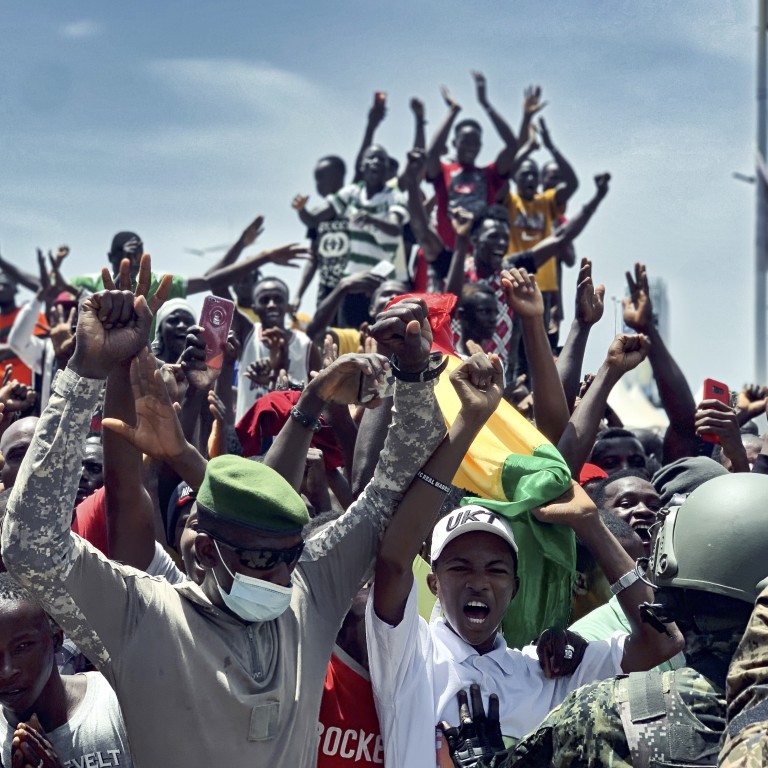
Guinea coup adds to growing knots in China’s belt and road plans
- It is the latest in a series of recent military takeovers in a strategic region for Chinese trade ambitions
- China is a key player in the Guinean economy, buying most of its bauxite and with a key stake in its iron ore reserves
The ousting of Guinean president Alpha Conde, recent military takeovers in Chad and Mali, as well as an attempted coup in Niger could complicate China’s inroads into the semi-arid Sahel region and parts of West and Central Africa.
China belt and road ‘not ideological’ foreign minister says
Chad has petroleum, and it is where China’s largest oil producer China National Petroleum Corp has an operation which mostly exports to China, India and the US. There are also growing Chinese trade ties with Niger, especially in uranium exploration and mining.
The seizure of power in Guinea is the latest disruption to the region. Conde was arrested and his government dissolved at the weekend. Border closures and a nationwide curfew were imposed and quickly lifted by the coup leaders, well aware that the mining industry is the mainstay of the West African nation’s economy.
Trouble started last year when Conde altered the constitution that allowed him to run for a third term in October 2020. His win led to violent protests in the capital Conakry, with opposition terming the election a sham.
The market reacted to the political unrest in Guinea by sending aluminium prices to a 10-year high on Monday on concerns of a likely disruption to bauxite supply from the second-largest producer of the key material in the world, accounting for 22 per cent of production.
Apart from supplying European smelters, Guinea is the primary source of material for the Chinese aluminium industry, according to Boris Sinitsyn, head of metals and mining research at investment bank Renaissance Capital. Bauxite and alumina prices have recently lagged aluminium quotes, while any supply disruption might further propel them, he said.
China’s appetite for Australian bauxite may climb after Guinea coup
In 2019, Guinea sold most of its iron ore – worth about US$2.1 billion – to China, according to the Observatory of Economic Complexity.
China is a key player in the Guinean economy, buying most of its bauxite, and Chinese companies have a stake in the country’s iron ore reserves, including the world’s largest iron ore project, the Simandou mine, currently under development.
China believes the iron ore might help it cut its reliance on Australian imports amid trade tensions. But the project has been stalled for years, over disagreements about who should develop it, corruption, political uncertainty and lack of funding.
Chinese companies have backed a consortium of the Societe Miniere de Boke (SMB) and Singapore’s Winning Shipping to develop blocks 1 and 2 of Simandou, with an eye to production starting by 2025. Simandou’s 3 and 4 blocks are owned 45.05 per cent by Anglo-Australian multinational Rio Tinto, with Aluminium Corporation of China (Chinalco) holding 39.95 per cent. The remaining 15 per cent is held by the Guinean government.
Chinese firms’ direct investment in Africa rises despite Covid-19
Although Guinea’s junta has promised to honour all existing mining agreements, political uncertainty still looms large.
Samuel Ramani, an Oxford University international relations specialist, said the Guinea coup poses an immediate risk to Chinese interests, which are concerned about the stability of global aluminium markets.
“The increase in aluminium prices observed after Guinea adversely impacted China’s bottom line. China’s calls for the release of Alpha Conde and condemnation of the coup are to be expected but now there is a real material interest at stake.”
Ramani said the spate of coups in Mali, Chad and Guinea certainly reduced the Sahel’s appeal as a frontier of expansion for the belt and road plan. He added that China was likely to maintain its peacekeeping presence in Mali, but might be deterred from making major new investments.
“It is hard to see China demonstrably increasing its role as a security provider in the region, even as it views France’s apparent commitment to winding down Operation Barkhane with concern, and China might quietly hope France reconsiders its drawdown from Mali,” he said.

07:49
SCMP Explains: China’s growing role in UN peacekeeping missions in Africa
The Sahel region, which extending from the Atlantic coast of Senegal to Eritrea on the Red Sea coast, is a strategic point for China’s trade ambitions in Africa. Its investments in the region are vast – in Senegal, Niger, Chad, Nigeria, Sudan, and Burkina Faso.
Chinese companies are building railway links to connect landlocked Mali to ports in Dakar, Senegal, and Conakry in Guinea, and Beijing signed a memorandum of understanding with Bamako last year to cooperate on the belt and road scheme.
Mohammed Soliman, a scholar at the Middle East Institute in Washington, said the Sahel region is central to Beijing’s Africa strategy and the Belt and Road Initiative’s broader objectives.
“Indeed, the emerging trend of military coups d’etat threatens the security and stability of the broader region in a way that would jeopardise Beijing’s objectives and existing investment in infrastructure projects across the region,” he said.
How far will China go to protect Africa after Taliban took Afghanistan?
Like many regional and international players, China is in wait-and-see mode before pursuing a specific policy direction. But early engagement with new rulers is likely to be an option in the meantime, Soliman said.
John Calabrese, director of the Middle East-Asia Project, said China’s approach to peace and security in West Africa and the Sahel is driven by the desire to protect its economic interests and project an image of being a “responsible” major power.
He outlined the Chinese economic interests at stake as investments in Niger’s uranium mines and Chad’s oil sector and said the instability emanating from the Sahel had created an opportunity to increase arms exports to, for example, Ghana.
Calabrese said Beijing has donated money (probably upwards of $45 million) to support the G5 Sahel Joint Force’s efforts to fight violent extremism. However, beyond that, “China’s security engagement in the Sahel has likely been impeded by its lack of counterterrorism expertise”.
What is China’s Belt and Road Initiative all about?
Analysts said China usually finds a way of working with whoever becomes leader, as it does not want to be seen taking sides. But on Monday, China’s foreign ministry said Beijing opposed coup attempts as a way to seize power and called for Conde’s release.
W. Gyude Moore, a senior policy fellow at the Centre for Global Development and a former Liberian minister of public works, said China is pragmatic and has a long history of avoiding political questions in its partner states. Whatever government emerges as the “accepted”, even if illegitimate government, in Guinea would be treated as such, he said.
“China is planning on working with the Taliban in Afghanistan. Hard to see who they wouldn’t find a way to work with,” Moore said. “So, while China, like any other investor, would require stability – it will adjust and adapt to what is becoming a volatile region.”
Taliban to support belt and road plan of ‘trustworthy friend’ China
David Shinn, a professor at George Washington University’s Elliott School of International Affairs, said that unless Guinea collapsed into political chaos, “I don’t think the coup will have much impact on the bauxite and iron ore reserves. They are too important to the country’s economy and the new military government seems to be pragmatic”.
Shinn said historically China had negotiated changes of government, both legal and illegal, in Africa without significant damage to its economic ties. “China has huge interests in both Guinea’s bauxite and iron ore deposits. I believe these ties will continue uninterrupted.”.
On the other hand, Shinn said, the continuing political instability in the Sahel region may well cause China to reconsider future economic commitments there. “China usually avoids getting involved in African politics.”

